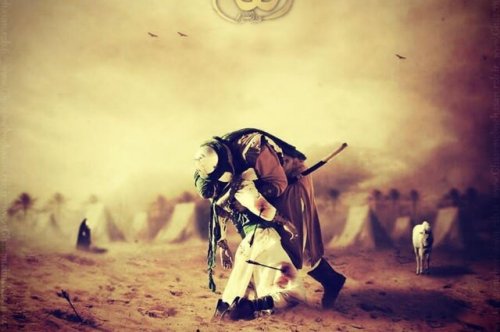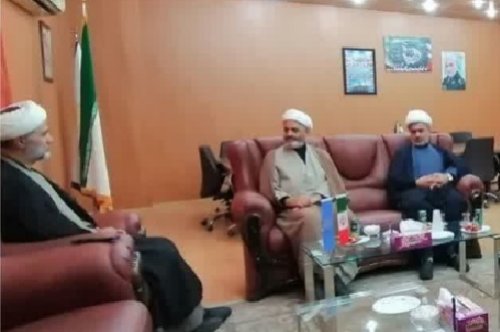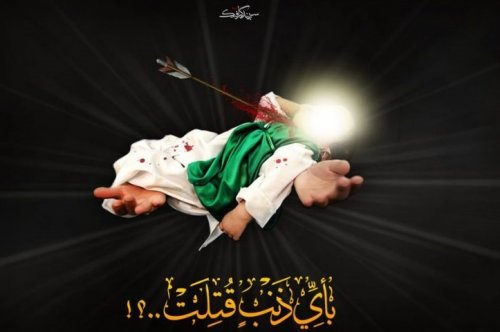The seventh night of the month of Muharram is attributed to the infant child of Hazrat Aba Abdullah al-Hussein (peace be upon her).
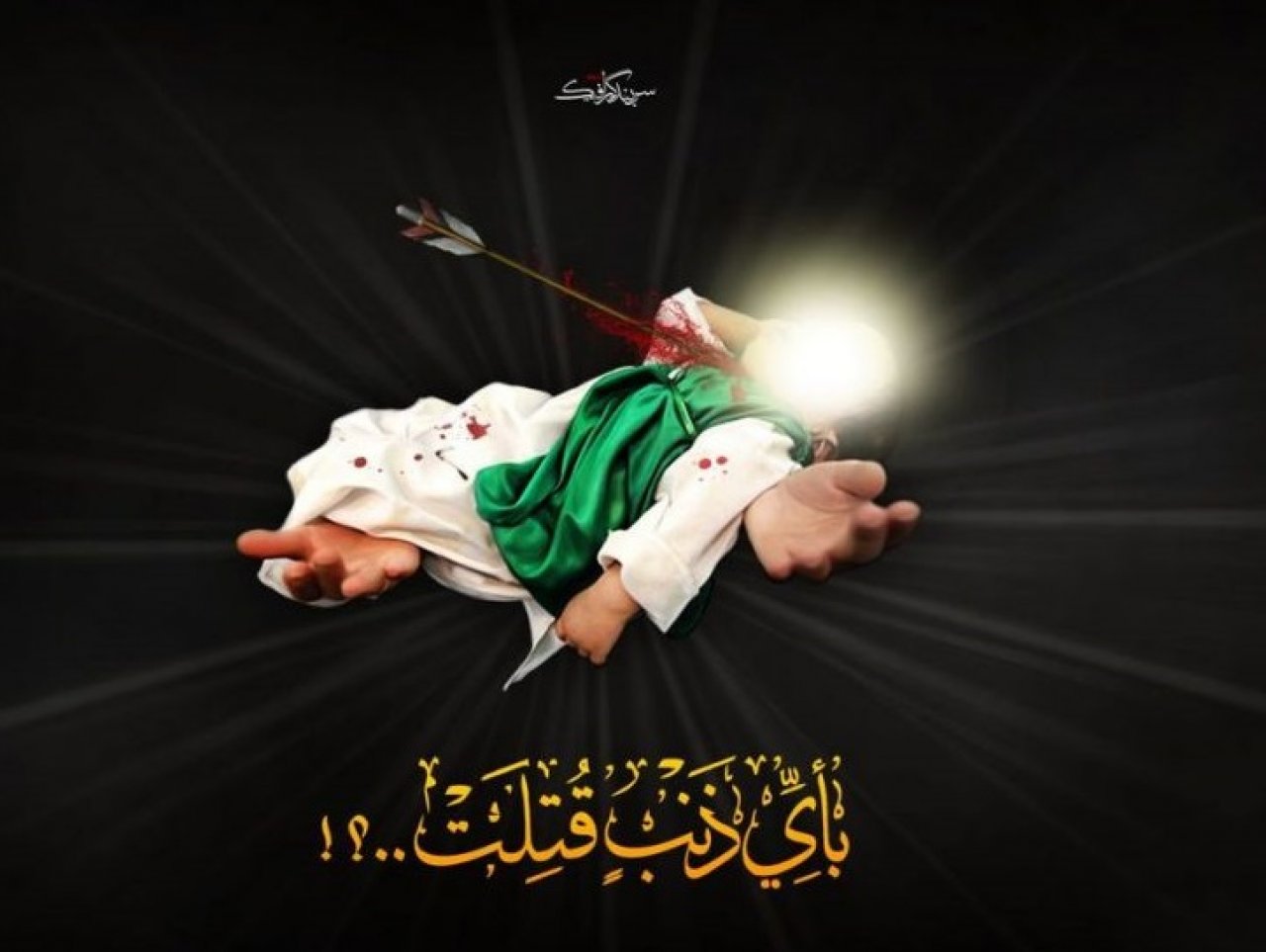
1 - Ali Asghar lineage
Hazrat Ali Asghar (peace be upon him) is the youngest son of Imam Hussain (peace be upon him) and Hazrat Rabab, the daughter of Amr al-Qais, who was martyred by the cursed three-pointed arrow of Harmala bin Kahl Asadi.
According to many sources, it is possible that Imam Hussein, in addition to Ali Akbar (peace be upon him), two other sons of the Imam; One named Ali Asghar and another named Abdullah were martyred in Ashura. Because according to some reports, he had six sons, two of whom were named Abdullah and Ali Asghar. Probably, these two sons of Imam were both martyred on the day of Ashura, with the difference that one was an infant and the other was several years old. The reports in which the word "Razee' (infant)" is used or state that a child of the Imam who was born on the day of Ashura, was shot on the father's hand and became a martyr, refers to the martyrdom of one of these children. [1] [2]
2- The tragedy of Ali Asghar
The tragedy of Ali Asghar (peace be upon him) was life-threatening for Imam Hussain (peace be upon him), as he cried and said to God: O God, judge between us and this people. They called us to help, but they are bent on killing us. [3] [4] [5] [6] At this moment, a call came from the sky saying: O Hussein (peace be upon him), don't worry about Asghar (peace be upon him), a nanny in heaven is ready to nurse him. [7] Hussein (peace be upon him) is the best example of stability and satisfaction. After enduring the martyrdom of all his companions and youths, he brought his infant child to the field. When Ali Asghar was also sacrificed, he submitted to God's judgment and said to God: O God! Because you see these scenes, it becomes easy for me to bear these calamities.[8][9][10][11][12][13][14]
It is narrated in Muqatil that when all the companions and companions of Imam Hussain (peace be upon him) were martyred and there was no one left except Ali Zain al-Abdin (peace be upon him) and another boy named Abdullah who was an infant, the Imam's strange voice was raised: "Does anyone who melts melt away from the sanctuary of the Messenger of God?" Am I the only one who fears Allah? Am I a helper, I ask God for help?"; "Is there anyone who can drive the enemy away from the Prophet's shrine? Is there a religion that fears God and helps us? Is there anyone who can help us for our reward?" [15][16][17][18][19][20][21][22][23][24]
3- The manner of Ali Asghar's martyrdom
Regarding the testimony of the infant child, from the summation of what is mentioned in the sources, two promises can be obtained:
One of them states that the infant was martyred when he was on the lap of the Imam at the door of the tents. Most of the obituaries and historians, with some differences, have put forward this opinion.[25][26][27][28][29][30][31] The second opinion is that that child was shot by the enemy on the Imam's hand on the battlefield and was martyred.[32]
3.1 - Testimony next to the tabernacle
When you call out, "Do you melt away from the sanctuary of the Messenger of God?" It reached the ears of the women of the shrine, their crying and crying got louder, the imam came to the side of the tent and said to Hazrat Zainab (peace be upon him): "Navlouni Alyah Ibni al-Tiffla Hatti Owadi'ah"; "Give me my little son Ali so that I can see him for the last time and say goodbye to him." When the Imam (peace be upon him) held Ali Asghar in his arms, he asked him to kiss him, and the cursed haremla threw an arrow and sat on the child's throat and killed the child in his father's arms. [33][34][35][36][37][38][39][40][41]
In this regard, Seyyed Haider Hali says:
And in turn, ahoy to kiss the child, before me, the direction of the arrow
"Imam Hussain (peace be upon him) bent down to kiss his infant child, but the arrow kissed his throat before the Imam."[42] The Imam gave the child to Zainab (peace be upon him) and said: Hold him, and he put his hand under the child's throat, it was filled with blood, and he sprinkled that blood towards the sky and said: "Hawwana alaiyah ma nazal bi annah bi'ayn e lallah." "; "Because God sees this scene, what happened to me from this calamity is easy for me." [43][44][45][46][47][48][49][50]
So Hussein (peace be upon him) took his blood and collected it and threw it to the sky and not a drop of it fell on the ground. Imam Baqir (peace be upon him) said: If a drop of that blood were to fall on the ground, punishment would descend. [54]
3.2 - Martyrdom on the battlefield
Another narration about the martyrdom of Ali Asghar (peace be upon him) is that that sweet child was martyred on the battlefield and on the hands of Seyyed al-Shahadah (peace be upon him), not by the side of the tent. Some historical sources have reported that: When the Imam said goodbye to his family, Umm Kulthum requested Imam Hussein (peace be upon him) to ask for a drink of water for Ali Asghar (peace be upon him). The Imam took the infant in his arms and brought him to the army of Kufa and said: "O people, you have killed my brother, my children, and the Ansari, and the rest of us, except for this child, and he is thirsty for something other than Zen." ْبٍ عتاهُ علىْكْمْ فُسْقُوُ Sharْباخ مْالْمْ"; "O people! You killed my brother, my children and my companions and there is no one left except this child. He is burning with thirst while he has no sin. Water him with a sip of water." [55][56] And in other words, he said: "Don't have mercy on this child"; "If you don't have mercy on me, have mercy on this innocent child." [57][58][59][60][61][62] At the same moment that the Imam was speaking, on the order of Omar Saad, Harmala bin Kahl Asadi aimed an arrow at Ali Asghar's throat and slit the child's throat from ear to ear. The Imam filled his palm with Ali's blood and threw it towards the sky and said: "O Allah, I am your witness against these people, so let them take a vow that they do not leave anyone from the Prophet's progeny"; "God, I take you as a witness that these people have planned not to leave even one of your Prophet's children alive." The calamity was so painful that the imam presented himself before God with tears in his eyes: "O Allah, judge between us and between the people, call us to support us and kill us"; "O God, judge between us and the people who have invited us to help us, but they kill us!" [63][64][65][66][67][68]
4- After the martyrdom of Ali Asghar
After being targeted by Ali Asghar, Imam Hussain took his hand under his throat and when it was full of blood, he threw it into the sky. Imam Baqir (peace be upon him) said: "Not a drop of this blood was spilled on the ground". [70] Some have also written that he said: "O God, the martyrdom of this child is not less than the killing of the Prophet's righteous son (peace be upon him). [71] O God, if you have withheld your victory and victory from us today, put it in something that is better for us." [72] At this time, a voice arose from the sky saying: "Oh Hussein! Leave your infant, for there is already a nurse in heaven for him".[73][74][75] Some historians have written that Hussain returned the blood-soaked Qandaqah to the tent and handed it over to Hazrat Zainab (peace be upon him). [76] Others have narrated that after her martyrdom, the Imam (peace be upon him) dug a grave and wrapped his body in a cloth and prayed over it.[7] 7] Some have also written that he brought his body and placed it next to the bodies of other martyrs. [78]
5 - Invalid reports
It should be said that in a number of recent sources, there have been reports about the sufferings of Ali Asghar, which cannot be seen in reliable sources, such as what is said in Rawdah al-Shahada, about Ali Asghar's mother becoming weaned, that: Imam Hussain (peace be upon him) held Ali Asghar in his arms and sang: O people! If according to you, I have sinned, this child has no sin. Give him a sip of water because he is so thirsty that there is no milk left in his mother's breast. Or what is stated in the book of Al-Hussein (peace be upon him) that: There was a dispute among the army of Omar bin Saad about giving water to Ali Asghar. Ibn Saad said to Harmaleh: Stop this quarrel! Or what is mentioned in the funeral letter of the family of Muhammad (peace be upon him) that: Harmleh said to Mukhtar: Now that you are killing me, let me tell my deeds so that I can burn your heart. O Amir! I had three three-pronged arrows that I mixed with poison. With one of them, I tore the throat of Ali Asghar in Hossein's arms; With the second, I aimed at Hussein's heart..., and with the third, at the throat of Abdullah bin Hassan. Or what is stated in Muhariq al-Qalub that: Ali Asghar, after being shot, looked at his father and smiled, and then he was martyred.[79][80] It should also be noted that what is repeatedly heard that the child was six months old, there is no valid document.[81][82]
6- Ali Asghar Bab al-Hawaij
Ali Asghar is called Bab al-Hawaij, because even though he was an infant, his position is high in the eyes of God. [83]
Imam al-Zaman (peace be upon him) says during the visit to the holy area: "Peace be upon 'Abd Allah ibn al-Hussein (peace be upon him) the infant, the one who has the blood, the one who has the blood." The blood in the sky, the sacrifice of the arrow in the grave of Abiyya, the curse of God is the hand of Harmalah bin Kahil al-Asadi”; "Peace be upon Abdullah bin Hussain (peace be upon him), the same infant who was the target of an arrow of oppression and was smeared with his blood, and his blood ascended to the sky and was slaughtered by an arrow in the arms of his father. May God curse his murderer Harmala bin Kahl Asadi." َ عليهمْ وَ علي والدك علي الاسغر-e الذي فوجعت به"; "God's peace be upon you and upon them (the martyrs) and upon your son Ali Asghar, for whom you grieved."[89][90][91]
7 - Footnote
1. ↑ Mohammadi Rishahri, Muhammad, Encyclopaedia of Imam Hossein (peace be upon him) based on the Qur'an, hadith and history, vol.7, p.32.
2. ↑ Mohammadi Rishahri, Muhammad, Encyclopaedia of Imam Hossein (peace be upon him) based on the Qur'an, Hadith and History, vol.7, p.33.
3. ↑ Tabari, Muhammad bin Jarir, History of the Nations and Al-Muluk, vol.5, p.389.
4. ↑ Ibn Juzi, Abd al-Rahman, al-Muntazem fi Tarikh al-Muluk Walamm, vol. 5, p. 340.
5. ↑ Sabt bin Jozi, Yusuf bin Ghazaughli, Tazkira al-Khwas, vol. 1, p. 227.
6. ↑ Ibn Kathir, Ismail Ibn Umar, Al-Badaiyah and Al-Nahiyah, Vol. 8, p. 197.
7. ↑ Sabt bin Jozi, Yusuf bin Ghazaughli, Tazkira al-Khwas, vol. 1, p. 227.
8. ↑ Ibn Tavus, Ali Ibn Musa, Al-Malhouf fi Qatali al-Tufuf, Vol. 1, p. 169.
9. ↑ Seyyed Ibn Tavus, Allahuf fi Qatali al-Tufuf, p. 69.
10. ↑ Bahrani, Abdullah, Al-Avalam al-Imam al-Hussein (peace be upon him), p. 289.
11. ↑ Tabari, Muhammad bin Jarir, History of the Nations and Al-Muluk, vol. 5, p. 448.
12. ↑ Ibn Nama Hali, Jafar bin Muhammad, Muthir al-Ahzan, p. 70.
13. ↑ Fatal Nishabouri, Muhammad bin Ahmad, Al-Waezin University, Vol. 1, p. 188.
14. ↑ Khwarazmi, Muwafq bin Ahmad, The death of al-Hussein (peace be upon him), vol.2, p.37.
15. ↑ Mohammadi Rishahri, Muhammad, Imam Hossein's encyclopedia based on the Qur'an, hadith and history, vol.7, p.36.
16. ↑ Mohammadi Rishahri, Muhammad, Imam Hossein's encyclopedia based on the Qur'an, hadith and history, vol.7, p.37.
17. ^ Khwarazmi, Muwafq bin Ahmad, Maktal al-Hussein (peace be upon him), vol. 2, p. 36.
18. ↑ Bizoun, Labib, Karbala Encyclopedia, vol.2, p.140.
19. ↑ Majlisi, Mohammad Bagher, Bihar al-Anwar, vol. 45, p. 46.
20. ↑ Qomi, Sheikh Abbas, Nafs al-Mahmum, p. 317.
21. ↑ Qazvini, Seyyed Mohammad Kazem, Zainab Al-Kubari (peace be upon him) Man Al-Mahd al-Lahd, p.207.
22. ↑ Seyyed Ibn Tavus, Al-Malhouf Ali Qatali al-Tafouf, p. 168.
23. ^ Amin Ameli, Sayyed Mohsen, Ayan al-Shia, Vol. 1, p. 604.
24. ↑ Makarem Shirazi, Nasser, Ashura roots, motivations, events, consequences, p. 497.
25. ↑ Yaqoubi, Ahmed bin Ishaq, Tarikh Yaqoubi, vol. 2, p. 245.
26. ↑ Sheikh Mufid, Al-Arshad fi Ma'rifa Hajjullah Ali Al-Abad, Vol. 2, p. 108.
27. ↑ Tabarsi, Fazl bin Hasan, the announcement of al-Wori by Alam al-Hadi, p. 467.
28. ↑ Tabarsi, Fazl bin Hasan, Al-Ihtjaj, vol.2, p.25.
29. ↑ Fatal Nishabouri, Muhammad bin Ahmad, Al-Waezin University, Vol. 1, p. 188.
30. ↑ Ibn Kathir, Ismail Ibn Umar, Al-Badaiyah and Al-Nahiyah, vol. 11, p. 547.
31. ↑ Ibn Nama Hali, Jafar bin Muhammad, Muthir al-Ahzan, p. 70.
32. ↑ Sabt bin Jozi, Yusuf bin Ghazaughli, Tazkira al-Khwas, vol. 1, p. 227.
33. ↑ Mohammadi Rishahri, Muhammad, Encyclopaedia of Imam Hossein (peace be upon him) based on the Qur'an, hadith and history, vol.7, p.46.
34. ↑ Mohammadi Rishahri, Muhammad, Encyclopaedia of Imam Hussain (peace be upon him) based on the Qur'an, Hadith and History, vol.7, p.47.
35. ↑ Yaqoubi, Ahmed bin Ishaq, Tarikh Yaqoubi, vol. 2, p. 245.
36. ↑ Sheikh Mufid, Al-Arshad fi Ma'rifa Hajjullah Ali Al-Abad, Vol. 2, p. 108.
37. ↑ Tabarsi, Fazl bin Hasan, the announcement of al-Wori by Alam al-Hadi, p. 467.
38. ↑ Tabarsi, Fazl bin Hasan, Al-Ihtjaj, vol.2, p.25.
39. ↑ Fatal Nishabouri, Muhammad bin Ahmad, Al-Waezin University, Vol. 1, p. 188.
40. ↑ Ibn Kathir, Ismail Ibn Umar, Al-Badaiyah and Al-Nahiyah, vol. 11, p. 547.
41. ↑ Ibn Nama Hali, Jafar bin Muhammad, Muthir al-Ahzan, p. 70.
42. ↑ Mahalati, Zabihullah, Farsan Al Hija, p. 335.
43. ↑ Mohammadi Rishahri, Muhammad, Encyclopaedia of Imam Hussain (peace be upon him) based on the Qur'an, Hadith and History, vol.7, p.36.
44. ↑ Mohammadi Rishahri, Muhammad, Encyclopaedia of Imam Hussain (peace be upon him) based on the Qur'an, hadith and history, vol.7, p.37.
45. ↑ Seyyed Ibn Tavus, Allahuf fi Qatali al-Tufuf, p. 69.
46. ↑ Bahrani, Abdullah, Al-Avalam al-Imam al-Hussein (peace be upon him), p. 289.
47. ↑ Tabari, Muhammad bin Jarir, History of the Nations and Al-Muluk, vol. 5, p. 448.
48. ↑ Ibn Nama Hali, Jafar bin Muhammad, Muthir al-Ahzan, p. 70.
49. ↑ Fatal Nishabouri, Muhammad bin Ahmad, Al-Waezin University, Vol. 1, p. 188.
50. ↑ Khwarazmi, Muwafq bin Ahmad, The death of al-Hussein (peace be upon him), vol.2, p.37.
51. ↑ Fazil bin Zubair, Tasmiyyah Man Qatal al-Hussein, p. 24, researched by Seyyed Mohammad Reza Hosseini Jalali.
52. ↑ Abulfaraj Esfahani, Ali bin Hossein, Muqatil al-Talbeyin, p. 95.
53. ↑ Seyyed Ibn Tavus, Al-Malhouf Ali Qatali Al-Tufuf, pp. 168-169.
54. ↑ Ibn Atham Kufi, Abu Muhammad Ahmad bin Atham, al-Futuh, vol. 5, p. 115.
55. ↑ Bizoun, Labib, Karbala Encyclopedia, vol.2, p.147.
56. ↑ Makarem Shirazi, Nasser, Ashura roots, motivations, events, consequences, p. 498.
57. ↑ Mohammadi Rishahri, Muhammad, Imam Hossein's encyclopedia based on the Qur'an, hadith and history, vol.7, p.42.
58. ↑ Mohammadi Rishahri, Muhammad, Imam Hossein's encyclopedia based on the Qur'an, hadith and history, vol.7, p.43.
59. ↑ Sabt bin Jozi, Yusuf bin Ghazaughli, Tazkira al-Khwas, vol. 1, p. 227.
60. ^ Qomi, Sheikh Abbas, Safina al-Bahar, vol.5, p.57.
61. ↑ Qazvini, Seyyed Mohammad Kazem, Zainab Al-Kubari (peace be upon him) Man Al-Mahd al-Lahad, p.208.
62. ↑ Bizoon, Labib, Karbala Encyclopedia, vol.2, p.146.
63. ↑ Mohammadi Rishahri, Muhammad, Encyclopaedia of Imam Hossein (peace be upon him) based on the Qur'an, hadith and history, vol.7, p.42.
64. ↑ Mohammadi Rishahri, Muhammad, Encyclopaedia of Imam Hossein (peace be upon him) based on the Qur'an, hadith and history, vol.7, p.43.
65. ↑ Tabari, Muhammad bin Jarir, History of the Nations and Al-Muluk, vol.5, p.389.
66. ↑ Ibn Juzi, Abd al-Rahman, al-Muntazem fi Tarikh al-Muluk Walamm, vol. 5, p. 340.
67. ↑ Sabt bin Jozi, Yusuf bin Ghazaughli, Tazkira al-Khwas, vol. 1, p. 227.
68. ↑ Ibn Kathir, Ismail Ibn Umar, Al-Badaiyah and Al-Nahiyah, Vol. 8, p. 197.
69. ↑ Abu Mokhnaf, Lot bin Yahya, Death of al-Hussein (peace be upon him), vol. 1, p. 173.
70. ↑ Ibn Tavus, Ali Ibn Musa, Al-Malhouf fi Qatali al-Tufuf, Vol. 1, p. 169.
71. ↑ Mahalati, Zabihullah, Farsan Al Hija, Vol. 1, p. 272.
72. ↑ Khwarazmi, Muwafq bin Ahmad, The death of al-Hussein (peace be upon him), vol.2, p.37.
73. ↑ Mohammadi Rishahri, Muhammad, Encyclopaedia of Imam Hossein (peace be upon him) based on the Qur'an, hadith and history, vol.7, p.42.
74. ↑ Mohammadi Rishahri, Muhammad, Encyclopaedia of Imam Hossein (peace be upon him) based on the Qur'an, hadith and history, vol.7, p.43.
75. ↑ Sabt bin Jozi, Yusuf bin Ghazaughli, Tazkira al-Khwas, vol. 1, p. 227.
76. ↑ Abu Makhnaf, Lot bin Yahya, Death of al-Hussein peace be upon him, vol. 1, p. 173.
77. ↑ Khwarazmi, Muwafq bin Ahmad, The death of al-Hussein (peace be upon him), vol.2, p.37.
78. ↑ Tabarsi, Fazl bin Hasan, Al-Wori's announcement in Alam Al-Hadi, Vol. 1, p. 466.
79. ↑ Mohammadi Rishahri, Muhammad, Encyclopaedia of Imam Hossein (peace be upon him) based on the Qur'an, hadith and history, vol.7, p.32.
80. ↑ Mohammadi Rishahri, Muhammad, Encyclopaedia of Imam Hossein (peace be upon him) based on the Qur'an, Hadith and History, vol.7, p.33.
81. ↑ Mohammadi Rishahri, Muhammad, Encyclopaedia of Imam Hossein (peace be upon him) based on the Qur'an, hadith and history, vol.7, p.32.
82. ↑ Mohammadi Rishahri, Muhammad, Encyclopaedia of Imam Hossein (peace be upon him) based on the Qur'an, Hadith and History, vol.7, p.33.
83. ↑ A group of authors, Farhang Ashura, vol.1, p.99.
84. ↑ Mohammadi Rishahri, Muhammad, Encyclopaedia of Imam Hossein (peace be upon him) based on the Qur'an, hadith and history, vol.7, p.32.
85. ↑ Mohammadi Rishahri, Muhammad, Encyclopaedia of Imam Hossein (peace be upon him) based on the Qur'an, Hadith and History, vol.7, p.33.
86. ↑ Seyyed Ibn Tavus, Al-Iqbal Balaamal al-Hasaneh, Vol. 3, p. 74.
87. ↑ Mousavi Muqaram, Seyyed Abd al-Razzaq, Maktal al-Hussein (peace be upon him), p. 272.
88. ↑ Majlesi, Mohammad Baqer, Bihar al-Anwar, vol.101, p.270.
89. ↑ Mohammadi Rishahri, Muhammad, Encyclopaedia of Imam Hossein (peace be upon him) based on the Qur'an, hadith and history, vol. 12, p. 82.
90. ↑ Mohammadi Rishahri, Muhammad, Encyclopaedia of Imam Hossein (peace be upon him) based on the Qur'an, hadith and history, vol. 12, p. 83.
91. ↑ Seyyed Ibn Tavus, Al-Iqbal Balaamal al-Hasaneh, Vol. 3, p. 71.
8 - Source
• Hozha information base, taken from the article "Nights of the Decade of Muharram", rewritten by Wiki Fiqh research group.
 English
English
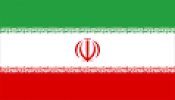 فارسی
فارسی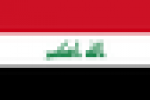 العربية
العربية

